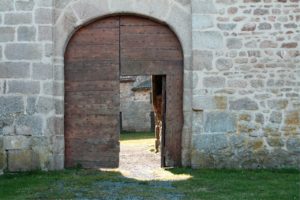
By Tony Crescio
“He who is forgiven little, loves little.” These are the words Jesus spoke to a Pharisee with whom he was dining after something quite remarkable happened. A woman, whom the Pharisee recognized as being a sinner, had just bathed the feet of Jesus with her tears, and anointed them with expensive ointment (see Luke 7:36-8:3). We may wonder why Jesus has directed such a comment to the Pharisee then, was he trying to explain the actions of the woman, or did he have another message for him?
We may begin by recognizing that, as opposed to the Pharisee, the woman has recognize Jesus as being God Himself as only God can forgive sins. For, as Luke tells us, when she learned where Jesus was, she made her way directly to him. The woman, recognizing her need for forgiveness and for a savior, is more open to and indeed hungry for the appearance of such a savior, which is why she reacts so desperately when she hears Jesus is close enough to reach. In contrast, the Pharisee and those seated at table with him have quite a high view of their state before God. He thinks to himself, ‘if this man [Jesus] knew that this woman was a sinner, he would never let her near him, much less touch him,’ for in those days to make contact with one who was unclean would make one unclean as well. In short, the Pharisee finds himself righteous, and as such, he was not looking for forgiveness, he was not looking for a Savior.
The world we live in today makes us susceptible to seeing ourselves as being self-sufficient. With just a couple pounds on our smartphone keyboard we can find the answer to almost any question or purchase any item we happen to desire at the time. Who would need saving when the world is at our fingertips? This illusion is blinding. Like the Pharisee, it gets us too focused on what we are capable of doing rather than recognizing what we can’t, saving ourselves. Consequently, it is good that we should deliberately set aside time to reflect upon where we have fallen short of living the life of the gospel. Where have we not ‘allowed Christ to live in us,’ as St. Paul speaks of in his letter to the Galatians?
My friends, there is only one door to the love of God, and that is forgiveness. If we desire to live life to the full, we must be reconciled to our God Who is the source of all life, and reconciliation can only come through unity with Jesus Christ, the Savior. But, unity with Jesus can only be had through love of neighbor (cf. Matthew 25). Now the dominoes all fall. Jesus tells us that only if we forgive others their offenses against us will our offenses against Him be forgiven (cf. Matthew 6:14-15). In other words, if we want to experience the love of God, we must love our neighbor. One of the best ways we can do this, is by forgiving offenses willingly, one of the spiritual works of mercy. In forgiving others we truly ‘put on Christ’ as Paul wrote, for in so doing, we extend the unmerited gift of love God has given to us through His Son. Yes, forgiveness is the only door to the love of God, and it only opens by holding it open for another. Open a door for someone in your life today.
Tony Crescio is the founder of FRESHImage Ministries. He holds an MTS from the University of Notre Dame and is currently a PhD candidate in Christian Theology at Saint Louis University. His research focuses on the intersection between moral and sacramental theology. His dissertation is entitled, Presencing the Divine: Augustine, the Eucharist and the Ethics of Exemplarity.
Tony’s academic publications can be found here.